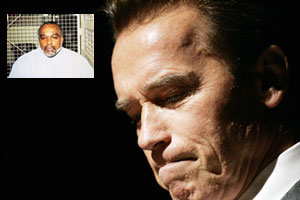
LOS ANGELES (FinalCall.com) – When California Governor Arnold Schwarzenegger refused clemency last December to Stanley “Tookie” Williams, death penalty opponents and grassroots activists vowed to remember this and repay him at the polls. But both Mr. Williams and the death penalty hovered under the radar as Gov. Schwarzenegger took California for a second term.
But his seemingly easy victory did not escape everyone. Mr. Williams’ long-time friend and publicist, Barbara Becnel helped propel his case to an international movement, and her actions catapulted her to a bid for governor in the early primary in June.
“I agree that Stanley Tookie Williams went under the radar, however, that’s not just the case for Stan, but the whole issue of the death penalty was like it just didn’t exist,” Ms.Becnel observed. “I blame the media. In one of the debates that Gov. Schwarzenegger and Phil Angelides had, which was sponsored by the California Broadcasters Association, they did not ask one question about the death penalty during the entire one-hour meeting. Public awareness around issues is driven by the media. I can stand out on a corner and talk about an issue all day long, but if the media doesn’t pick it up, then the people won’t hear about it.”
The people do care, she insisted. She is currently working on a project to commemorate the life and legacy of the peacemaker Stanley Tookie Williams as well as his torture and murder by the State of California, she informed. She is also participating in a national tour called “Witness to an Execution,” in which she tells her story of what California did to Mr. Williams. She further noted that during a Sept. 26 hearing in a San Jose federal courtroom on the lethal injection procedures of the State of California, the State admitted to torturing Mr. Williams.
Empty promises?
Political analysts and observers noted that the silence stemmed from anything but empty promises.
“Politicians count on people having short memories, and Schwarzenegger was able to transform himself by using his celebrity and surrounding himself with a different group of people,” stated Akili, an executive board member of the Community Call to Action And Accountability (CCTAA).
After Gov. Schwarzenegger lost the primary election, Akili positioned, among other things, he got rid of the more right wing conservatives who insisted he could do no wrong.
“He started sounding more like a Democrat and, if you couple that with his celebrity and his capacity to play roles, you get a whole new person,” Akili stated.
“Our capacity to organize against him and get people to remember what he was like a year ago was very limited,” he added. “On the one hand, you have his capacity to change and transform with the money to do it; and on our hand, you have the death penalty, resources and the rest. He was successful in getting his position and point out and we were not.”
Dominique DiPrima, producer and host of “Front Page,” a daily talk show of news, information and community issues, attributed the short-term amnesia to distractions.
“I think that we get so caught up in the next 24-hour news cycle that we forget about our core issue or issues that we were fired up about last week,” she said. “There are so many things to keep up with now, like police brutality, and I think people simply forgot.”
Mike Farrell is president of Death Penalty Focus, a non-profit organization dedicated to the abolition of capital punishment through grassroots organizing, research and the dissemination of information about the death penalty and its alternatives. He noted that Mr. Williams and the death penalty fell below radar because it is tough to pin an election result on a particular issue, and because neither Gov. Schwarzenegger or challenger Phil Angelides were opposed to the death penalty, which denied its rank as an issue during the election.
For its part, Mr. Farrell continued, Death Penalty Focus will continue its work of public education and profile of the issue, and is very interested in the work of the California Commission on the Fair Administration of Justice, which is now examining the criminal justice system.
“In the future, there’s going to be a demand from the people to end this system. The legislature call for a moratorium on it demonstrates that the death penalty used to be considered a third rail of politics. Politicians feared to talk about it, for it would cause an end to their political careers; that’s no longer the case,” he said.
He also pointed to signs of hope in the near impending abolition of the death penalty in New Jersey and corrective actions of chief officials in Illinois and Virginia. “These are signs of the coming end of the death system in the U.S. It’s not a question of if. It’s just a matter of when.”
Stan Muhammad, a West Coast gang intervention coordinator, cited desensitization toward murder and loss as a key reason why Blacks, at least, made no visible stir about Mr. Williams during the elections. He concluded, “We have become immune to death and loss.”












